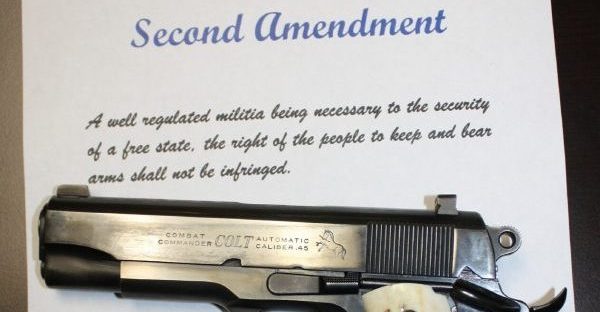
Several new gun laws took effect around the map on Saturday, and as the nation pauses to observe the 241st anniversary of its Declaration of Independence, it is a good time to reflect on why the Fourth of July is truly significant, not just to the nation, but to the world.
It’s not just about hot dogs, barbecued ribs and chicken, soda and beer chilling in an ice-filled tub. It is about the freedom to enjoy such things, and about the liberty to speak one’s mind and conscience.
And about a Constitution that protects the fundamental right which sets this nation apart from all the others. Those long-dead old white guys who signed the Declaration and later authored the Constitution had the wherewithal to include an insurance policy that has prevented the rise of a monarchy or dictatorship in this new land for which so many died to make independent.
As noted by Fox News, “In Tennessee, concealed guns may now be carried in a broader range of public buildings and bus stations. And in Iowa, permit holders are now able to carry concealed guns in the Capitol.”
Georgia and Kansas now allow guns on college campuses.
While all of this is going on, one can bet that officials in California were feverishly trying to figure out the best strategy to beat back a preliminary injunction handed down last week by a federal judge that temporarily blocks the state form enforcing its new magazine ban. This might have left the Founders perplexed; while some parts of the nation are restoring gun rights, another place is trying desperately to restrict them even more.
One might wonder what the reaction will be in New York to the hospital shooting last week, launched by what the New York Times called “a disgruntled doctor.” Dr. Henry Bello was armed with a legal semi-auto rifle. He killed another physician and shot several others before setting himself on fire and shooting himself, the newspaper reported.
Anti-gunners will figure out a way to exploit this tragedy, when the simple truth is that if someone in that hospital had been legally armed, they just might have been able to intervene. Gun prohibitionists dislike such common sense reasoning, and they try to dismiss it out of hand.
But they don’t really know how to answer questions about how this nation might never have existed without private firearms ownership. Who would have resisted British rule, and with what?
“We hold these truths to be self-evident, that all men are created equal, that they are endowed by their Creator with certain unalienable Rights, that among these are Life, Liberty and the pursuit of Happiness. — That to secure these rights, Governments are instituted among Men, deriving their just powers from the consent of the governed, — That whenever any Form of Government becomes destructive of these ends, it is the Right of the People to alter or to abolish it, and to institute new Government, laying its foundation on such principles and organizing its powers in such form, as to them shall seem most likely to effect their Safety and Happiness. Prudence, indeed, will dictate that Governments long established should not be changed for light and transient causes; and accordingly all experience hath shewn that mankind are more disposed to suffer, while evils are sufferable than to right themselves by abolishing the forms to which they are accustomed. But when a long train of abuses and usurpations, pursuing invariably the same Object evinces a design to reduce them under absolute Despotism, it is their right, it is their duty, to throw off such Government, and to provide new Guards for their future security…” — From the Declaration of Independence, July 4th, 1776
It was not uncommon back in the day to see people going about their business with a musket, powder and ball close at hand, especially in the villages of the day.
Even into the early 20th Century, and especially in the Midwest and West, schoolboys might ride their bikes to school with a .22 rifle or .410 shotgun across the handlebars.
When the Declaration of Independence was written, it detailed several grievances with the Crown that contributed to the need for freedom and liberty. Among them are complaints that England had “has erected a multitude of New Offices, and sent hither swarms of Officers to harass our people and eat out their substance,” and had “(imposed) taxes on us without our consent.”
Does that sound familiar today?
Still, the Constitution works. Before it was written, a nation had to be born, and the first step was to declare independence, which those Founders decided to do by officially declaring independence on July Fourth, 1776.
This country has endured one civil war and two World Wars. It was the Constitution that held the fabric together. Presidents have been murdered, but there were no military coups. One president resigned, but we followed the Constitution and weathered on.
Fireworks on the Fourth aren’t just for show. They signify the fact that this nation was not born quietly. Nobody sat around a campfire with the Redcoats and strummed their guitars to an amicable divorce.
The right to keep and bear arms is enshrined in the Bill of Rights. The Founders didn’t specifically delineate that right for the sake of cocktail party conversation. It is there for a reason. It protects all the other rights, like it or not, say Second Amendment activists. Those who don’t like it will simply have to choke that down Tuesday with their tofu and craft beer, while those who do will be content with burgers, hot dogs and chips.